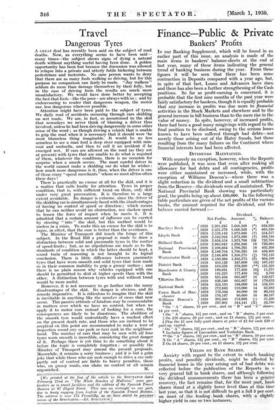Travel
Dangerous Tyres
A GREAT deal has recently been said on the subject of road deaths. Now, as everything seems to have been said- many times-the subject shows 'signs of dying a natural death without anything useful having been done. A golden opportunity has been lost because, the discussion was allowed to relapse into a private and utterly futile bickering between pedestrians and motorists. No sane person wants to deny that there are as many fools walking as driving, but for this purpose no comparison can fairly be made. "Jay walkers" seldom do more than damage themselves by their folly, but in the case of driving fools the results are much more unsatisfactory. We would have done better by _accepting the fact that fobls-like the poor-are always with us ;_ and by endeavouring to render that dangerous weapon, the motor
car, less dangerous wherever possible. -
• Attention might have been paid to the subject of tyres. We daily read of accidents occurring through cars skidding on .wet roads. We are, in fact, so, accustomed to the skid that nowadays we never think of blaming a driver thus involved, unless he had been driving dangerously in some other sense of the word ; as though driving a vehicle that is unable to grip the road when it is necessary that it should were 4 he most blameless thing imaginable. It would be no less senseless to see a man ford a deep river equipped with rain- coat and umbrella, and then to call it an accident if he emerged wet. If cars are allowed on the road (as they are at present) with tyres that are unable to do what is required of them, whatever the conditions, there is no occasion for surprise when a smash occurs. The most careful driver in the world cannot make a skidding car do what he wishes : how much more dangerous is it, then, when the driver is one of those crazy "speed merchants " whom we meet all too often these days!
There is practically no excuse at all for the skid, and it is a matter that calls loudly for attention. Tyres in proper condition, that is, with sufficient tread on them, only skid under very great provocation. It is therefore to a large extent avoidable. Its danger is extreme, since the driver of the skidding car is simultaneously faced with the disadvantages Of having no control of 'speed or direction ; 'which means that he' can neither avoid an obstruction, nor slacken speed to lessen the force of impact when he meets it. It is admitted that a certain amount of influence can be exerted by steering " into " the skid, but this method would be useless in a crisis. To make this an excuse for the skid is to argue, in effect, that the cure is better than the avoidance.
The Minister of Transport did touch the fringe of this subject. In the Road Bill a proposal is made to draw a distinction between solid and pneumatic tyres in the matter of speed-limits ; but, as no stipulations are made as to the standards of condition in which the latter should be kept, a sound train of reasoning is not brought to its logical conclusion. There is little difference between pneumatic tyres that have worn smooth and solid tyres that were made so in their common inability to grip a greasy surface ; and there is no plain reason why vehicles equipped with one should be permitted to skid at higher speeds than with the other. A distinction between tyres with and without tread would be more useful.
However, it is not necessary to go farther into the many disadvantages of the skid. Its danger is obvious, and its remedy imperative. It is ridiculous to imagine that the skid is inevitable in anything like the number of cases that now occur. This passive attitude of fatalism may be commendable in matters over which we have no control, but when we apply it to motor cars instead of looking for a cure, the consequences are likely to be disastrous. The abolition of the smooth tyre would undoubtedly have a marked effect on the present death rate, and those who are inclined to be sceptical on this point are recommended to make a tour of inspection round any car park or taxi rank in the neighbour- hood. The number of- cars that may be seen with all four tyres worn smooth is incredible, considering the great danger of it. Perhaps _there is yet time to do something about it before the topic is completely forgotten ; or possibly the Minister of -Transport may amend the present proposals. Meanwhile, it remains a sorry business ; and it is but a grim joke that while those who are rash enough to drive a car only partly out of control are liable to heavy penalties, those who, on greasy roads, can claim no control at all remain
























































 Previous page
Previous page